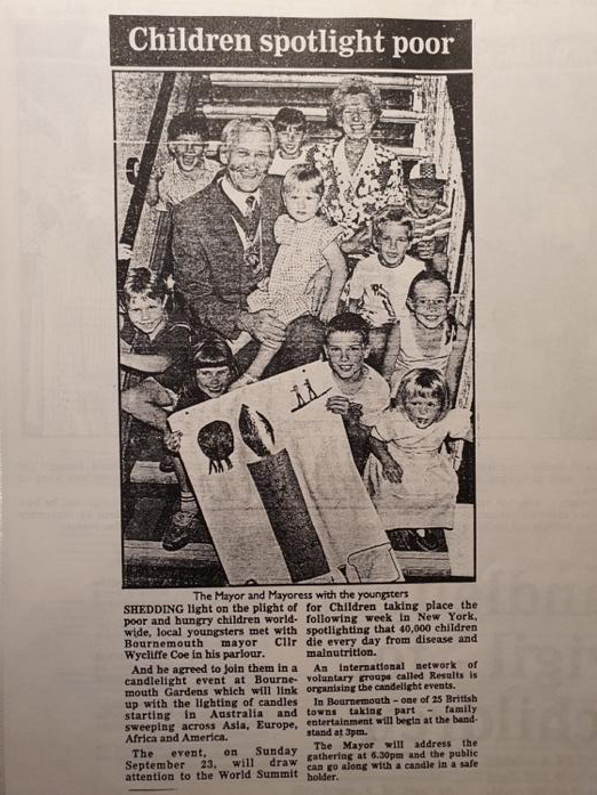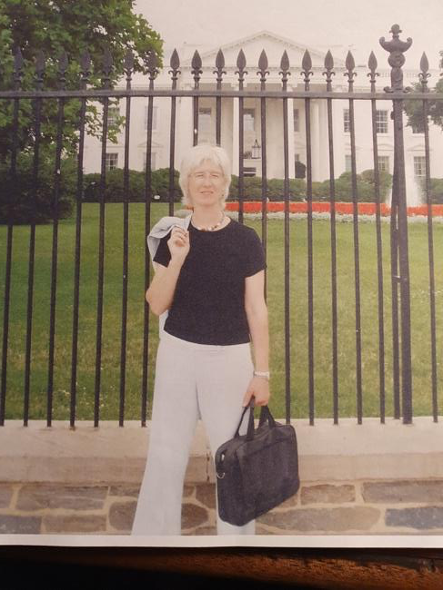This is a guest post by Harriet Stewart-Jones, a volunteer advocate with the Poole Results Group. Born in Birmingham in 1955, Harriet trained in marine biology and biochemistry before pursuing a career in publishing. For over 40 years she was a freelance book editor, working on non-fiction titles primarily in health and medicine. With her partner Trevann, she lives in Poole, Dorset, but they are lucky enough to spend several months each year in Laos, a beautiful country that has become like a second home to them.
I first heard about Results at a meeting in London in 1987. An audience member got up and spoke powerfully about the work of The Hunger Project and told us that a new initiative called Results UK was starting up. At the time I had a 6-week-old baby and was ready to get involved with the wider world. Here was something I could do at home that sounded incredibly efficient and effective, working with other people to tackle hunger and poverty.
Although I had a background in environmental campaigning, I knew nothing about international development. The simple format of Results appealed. I could turn up at a meeting, learn about an issue, write a letter and feel that I had done something, all in one evening slot.
Back home in Poole/Bournemouth, I teamed up with Liz and Malcolm Windett and Jon Finney to start a new local group. We invited Sheila Davie, the National Manager of Results UK, to come and speak in November 1988. The requirements for a new group were quite strict. We had to have four people willing to commit to two meetings a month – a Briefing and Action Meeting and a Preparation and Speaking Meeting – for at least four months. These people were known as “Partners” and the group was led by a “Group Leader”. Others who came along occasionally were “Participants”. We just about fulfilled the requirements and the group was formed.
Our first action was in December 1988. We sent letters to the local papers about the work of UNICEF and the State of the World’s Children Report. The Report’s author, Peter Adamson, was the Conference Call speaker that month.

Further monthly actions continued on the role of women in development planning, EEC aid, structural adjustment, and education for girls. The group grew over the next couple of years, with regular letters and articles in the local papers, and we started to develop a relationship with our local MPs.
Then in 1990 was our first big moment: a Candlelight Vigil in support of the World Summit for Children. We organised an ambitious event in Bournemouth Gardens with hundreds of people, speakers, music and dancers, attended by the Mayor. The event was opened by Matthew Kelly (a TV star), sponsored by the local paper, and broadcast live on BBC radio. Lots of fun and plenty of media coverage!

We’ve organised dozens of events in the years since then – cream teas, hunger suppers, quizzes, picnics, unfair bingo, plant sales and walks – but none have quite matched the scale and ambition of this first one.
Two highlights of my personal Results “career” were in the early 2000s. Annette Brooke was a newly-elected MP for North Poole in 2002 when Helen Davis and I went to speak to her at the library. We were lobbying for microcredit at that time, championing the movement to provide small loans – often £50 or less – to enable women in poor communities to start small enterprises.
Results had been at the forefront of lobbying to get an All Party Parliamentary Group (APPG) on Microfinance set up in Westminster. Annette listened to us attentively. She hadn’t heard about microfinance and thought it an excellent idea. She had no idea how to set up an APPG but she agreed to find out – which indeed she did! The APPG went on to do great work in support of the global microfinance movement.
In 2005, I travelled to the Results International Conference in Washington DC. It was an inspiring event, meeting people from all over the world who spoke with passion about the ending of hunger and poverty. There were four of us from the UK and we were invited to meet with Caroline Sergeant, the UK Executive Director of the World Bank in her office. We had chosen to speak to her about TB. As we talked, she picked up a hefty document from her desk. It was the World Bank’s draft Action for Africa. “There,” she said, “here’s the text on malaria and AIDS and primary health care.” “But what about TB?” we asked. “Oh of course, that should be in there as well,” she said, writing a note in the margin. TB appeared in the final report as a result.

Over the years, our group here in Poole has remained strong. We’re a group of committed individuals, we’re friends, and we’re determined to do something to combat inequality. Results gives us a focus, the tools, and a way to do our bit. Thirty-five years later we’re still working on it.